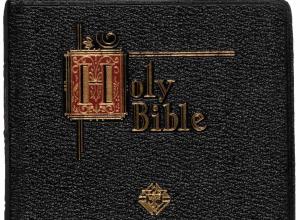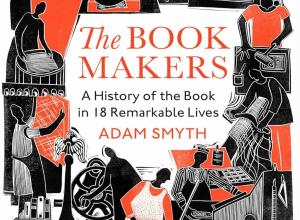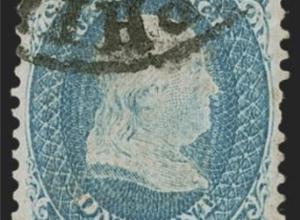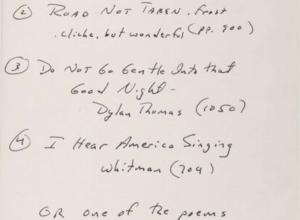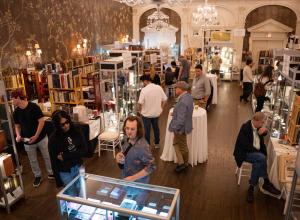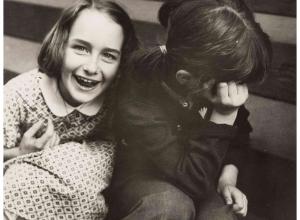September 2011 |
The Further Reminiscences of Norman Kane (Part 2 of 2)
In September's digital issue, we featured an interview with Norman Kane. Due to popular request, we have posted the remainder of the interview on the blog in two installments. The first, covering the rest of our book related questions, appeared last week. This second and final installment primarily covers Norman's experiences in America and Europe preceding his 50+ years as an antiquarian bookman.
In Norman's own words:
I was born in 1924 during the Consulate of Quiet Cal and grew up in Southeastern Pennsylvania (Delaware & Chester Counties). The first school I went to was a one-room school (although it had a 2nd floor as I remember) and one teacher. The alphabet on large printed cards went around the walls above the blackboards.
I went overseas in 1944 after an interval of various jobs. I was called up for the draft several times but was rejected for poor eyesight and worked in a shipyard, in a paper mill, and as a truck driver but the patriotic bug got me and I signed up to drive an ambulance in the (British) Eighth Army, so I was in Italy for the winter campaign up the mountain chain.
In Norman's own words:
I was born in 1924 during the Consulate of Quiet Cal and grew up in Southeastern Pennsylvania (Delaware & Chester Counties). The first school I went to was a one-room school (although it had a 2nd floor as I remember) and one teacher. The alphabet on large printed cards went around the walls above the blackboards.
I went overseas in 1944 after an interval of various jobs. I was called up for the draft several times but was rejected for poor eyesight and worked in a shipyard, in a paper mill, and as a truck driver but the patriotic bug got me and I signed up to drive an ambulance in the (British) Eighth Army, so I was in Italy for the winter campaign up the mountain chain.
I was injured once and sent back down to Naples until the cast could come off, and became for the nonce a soldier-tourist. Wangled a ticket to the first reappearance of Bengiamino Gigli at the San Carlo Opera House (his daughter sang Mimi), walked up Vesuvius wading through the ash to peer over the rim, wandered through Pompeii and Herculaneum, and was bowled over at the vividness of this paralyzed sight of Roman life, but most of all was fascinated by the frescoes--the Roman wall paintings have a vividness and wonderful grotesquery unlike anything else I have seen.
Then I was sent back up and as the Campaign advanced, got to walk around Florence, Bologna, and, ultimately, Venice, which I entered the day after it was liberated. I had been sideswiped by a big US Army truck on a mountain road, and only the front-wheel drive was working. There was a supply depot near Venice where I got and installed a new differential.
Then we went up into Austria for awhile and stayed in a chalet where a nice family of minor nobility lived. We weren't supposed to fraternize with them, but I did anyway with my fractured German. They arranged for me to have a room above an arch which was very picturesque.
We were shipped back down to the Neapolitan area. Had a foray over to the Adriatic coast in an Italian bus full of chickens, ducks, children and dilapidated luggage. The bus went to Amalfi, a Renaissance gem right on the edge of the Adriatic. When I got back everybody had left to ship out so I got my junk together, got a railroad warrant, went to the boot of Italy, ended up in the railroad yards, stumbled down over the tracks and caught the ship with minutes to spare.
The trip to India was on the Polish ship the Batory which achieved some notoriety during the Cold War. Went through the Red Sea, where we got hit by a plague of locusts. These things are six inches long. Just ate up the canvas. Went through the Indian Ocean to land in Bombay. First atom bomb was dropped two days before we hit port. We were to take part in the campaign in Burma, which was a very nasty war; we were told to wear side arms. So we were happy to a man that the War seemed to be over. Did the tourist bit in Bombay. Went up to the top of the hill and watched the vultures eating the corpses. Went to the Taj Mahal hotel and absolutely fell in love with trifle, a British desert--I thought this was the greatest thing I'd ever eaten. Shoveled into a railway carriage for the trip across India--very hard travel to Calcutta. Same thing there. We peered into the Black Hole of Calcutta. Wandered down to the Ganges to watch the burning ghats. Then shipped to Hyderabad in the center of India. A friend of mine and I went to Darjeeling, up in the Himalayas, the old playground for British officers in the summer. Darjeeling was a wonderful place (but now rife with ethnic conflict, I gather.) Rented a couple of horses and rode out to the lookout point where you can see Everest and saw the whole range of the Himalayas. Drank wonderful tea.
Trip homeward from Madras by plane in converted Dakotas and Lancaster bombers none of which had seats or heat or any passenger amenities. Landed on the beach at Bahrain. Refueled. Skipped over to North Africa. Walked into Aden and looked around. Then to Jerusalem. Were put up in the King David Hotel. Visited the Tomb of the Holy Sepulcher, walked up the Via Dolorosa, the usual tourist business.
Then flew to England. Had an epiphany at the Tate Gallery. They had just brought up from hiding many paintings and there was (in my young mind) the painting of paintings, Van Gogh's glorious Sunflowers! Sailed home on the Queen Mary which was converted to troop transport. They had left the dice pit for some reason, so of course some guys took it over right away. The ones who were running the games made a fortune. Landed in Halifax and took the train home. By then I couldn't even remember my family's phone number when I got off the train station.
Spent a few months in New York City visiting with friends and taking some courses at the New School and Columbia. One of the courses at Columbia was with Padraic Colum and Mary, his wife, on symbolism in literature. Colum looked like a leprechaun. Mary always wore one of those flower-pot hats made famous in old New Yorker cartoons. It was a very small class and consequently quite stimulating.
Won a scholarship to the University of Pennsylvania--studied English literature and American literature and history. BA in '49 and a MA in '50, by which time I was married. So I worked in a machine shop for while as a tool and diemaker. After a couple years of scraping along like that I saw this ad in the Antiquarian Bookman and the rest you already know ...
(When my wife and I would go to New York we always made a habit of going up to the top of the World Trade Center, having a Bloody Mary, taking a look at the harbor and the Statue of Liberty. By some crazy coincidence, three places that I have visited: the World Trade Center (site of a disastrous ABAA bookfair, by the way), the Taj Mahal Hotel and the King David Hotel, have all been objects of horrendous attacks. Perhaps it doesn't pay to brood about such things.)
Then I was sent back up and as the Campaign advanced, got to walk around Florence, Bologna, and, ultimately, Venice, which I entered the day after it was liberated. I had been sideswiped by a big US Army truck on a mountain road, and only the front-wheel drive was working. There was a supply depot near Venice where I got and installed a new differential.
Then we went up into Austria for awhile and stayed in a chalet where a nice family of minor nobility lived. We weren't supposed to fraternize with them, but I did anyway with my fractured German. They arranged for me to have a room above an arch which was very picturesque.
We were shipped back down to the Neapolitan area. Had a foray over to the Adriatic coast in an Italian bus full of chickens, ducks, children and dilapidated luggage. The bus went to Amalfi, a Renaissance gem right on the edge of the Adriatic. When I got back everybody had left to ship out so I got my junk together, got a railroad warrant, went to the boot of Italy, ended up in the railroad yards, stumbled down over the tracks and caught the ship with minutes to spare.
The trip to India was on the Polish ship the Batory which achieved some notoriety during the Cold War. Went through the Red Sea, where we got hit by a plague of locusts. These things are six inches long. Just ate up the canvas. Went through the Indian Ocean to land in Bombay. First atom bomb was dropped two days before we hit port. We were to take part in the campaign in Burma, which was a very nasty war; we were told to wear side arms. So we were happy to a man that the War seemed to be over. Did the tourist bit in Bombay. Went up to the top of the hill and watched the vultures eating the corpses. Went to the Taj Mahal hotel and absolutely fell in love with trifle, a British desert--I thought this was the greatest thing I'd ever eaten. Shoveled into a railway carriage for the trip across India--very hard travel to Calcutta. Same thing there. We peered into the Black Hole of Calcutta. Wandered down to the Ganges to watch the burning ghats. Then shipped to Hyderabad in the center of India. A friend of mine and I went to Darjeeling, up in the Himalayas, the old playground for British officers in the summer. Darjeeling was a wonderful place (but now rife with ethnic conflict, I gather.) Rented a couple of horses and rode out to the lookout point where you can see Everest and saw the whole range of the Himalayas. Drank wonderful tea.
Trip homeward from Madras by plane in converted Dakotas and Lancaster bombers none of which had seats or heat or any passenger amenities. Landed on the beach at Bahrain. Refueled. Skipped over to North Africa. Walked into Aden and looked around. Then to Jerusalem. Were put up in the King David Hotel. Visited the Tomb of the Holy Sepulcher, walked up the Via Dolorosa, the usual tourist business.
Then flew to England. Had an epiphany at the Tate Gallery. They had just brought up from hiding many paintings and there was (in my young mind) the painting of paintings, Van Gogh's glorious Sunflowers! Sailed home on the Queen Mary which was converted to troop transport. They had left the dice pit for some reason, so of course some guys took it over right away. The ones who were running the games made a fortune. Landed in Halifax and took the train home. By then I couldn't even remember my family's phone number when I got off the train station.
Spent a few months in New York City visiting with friends and taking some courses at the New School and Columbia. One of the courses at Columbia was with Padraic Colum and Mary, his wife, on symbolism in literature. Colum looked like a leprechaun. Mary always wore one of those flower-pot hats made famous in old New Yorker cartoons. It was a very small class and consequently quite stimulating.
Won a scholarship to the University of Pennsylvania--studied English literature and American literature and history. BA in '49 and a MA in '50, by which time I was married. So I worked in a machine shop for while as a tool and diemaker. After a couple years of scraping along like that I saw this ad in the Antiquarian Bookman and the rest you already know ...
(When my wife and I would go to New York we always made a habit of going up to the top of the World Trade Center, having a Bloody Mary, taking a look at the harbor and the Statue of Liberty. By some crazy coincidence, three places that I have visited: the World Trade Center (site of a disastrous ABAA bookfair, by the way), the Taj Mahal Hotel and the King David Hotel, have all been objects of horrendous attacks. Perhaps it doesn't pay to brood about such things.)






